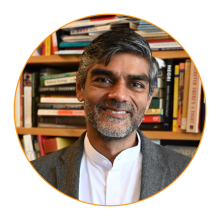We're proud to highlight the sustainability efforts of LBJ School faculty experts in honor of Earth Day and every day.
Sustainable Agriculture

Dr. Raj Patel is examining how cities in the United States can learn from their global counterparts to promote sustainable farming practices. In collaboration with the International Panel of Experts on Sustainable Food Systems and with LBJ students, this initiative seeks to identify ways to support agroecological farming for improved environmental and economic outcomes. Learn more.
Energy Development

When we use hydraulic fracturing to produce oil and gas, energy development projects can affect the land that farmers use to grow crops. A recent study published by Dr. Sheila Olmstead in Energy Policy found that more oil and gas development means less land for farming, though these effects are in some cases temporary. Read more.
Water Management

An important water-focused initiative from Dr. David Eaton seeks to improve water quality in the Lower Rio Grande/Rio Bravo, the river bordering Texas and Tamaulipas, from Laredo/Nuevo Laredo to the Gulf of Mexico. Preventing and treating pollution in the river will improve sustainable agriculture on both the U.S. and Mexican sides of the border and also improve sustainable water supply for the millions of people who live in the region.
At the Texas Legislature

A new bill would fine residents who make more than three complaints to the state environmental agency in a year if they don't result in enforcement action, citing concerns that they clog up government resources. But a study from Dr. Mary Evans found that investigations from citizen complaints were more likely to find violations than those not instigated by complaints. Read more.

